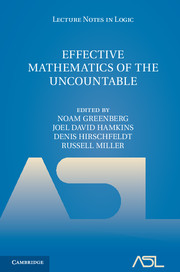Book contents
- Frontmatter
- Contents
- Preface
- Introduction
- Some results on ℝ-computable structures
- Infinite time Turing machines and an application to the hierarchy of equivalence relations on the reals
- Computable structure theory using admissible recursion theory on ω1 using admissibility
- Local computability and uncountable structures
- Borel structures: a brief survey
- E-recursive intuitions
- Reverse mathematics, countable and uncountable: a computational approach
- Effective model theory: approach via σ-definability
Preface
Published online by Cambridge University Press: 05 December 2013
- Frontmatter
- Contents
- Preface
- Introduction
- Some results on ℝ-computable structures
- Infinite time Turing machines and an application to the hierarchy of equivalence relations on the reals
- Computable structure theory using admissible recursion theory on ω1 using admissibility
- Local computability and uncountable structures
- Borel structures: a brief survey
- E-recursive intuitions
- Reverse mathematics, countable and uncountable: a computational approach
- Effective model theory: approach via σ-definability
Summary
Although classical computable model theory is most naturally concerned with countable domains, several methods – some old, some new – have extended its basic concepts to uncountable structures. Unlike in the classical case, however, no single dominant approach has emerged, and different methods reveal different aspects of the computable content of uncountable mathematics. Furthermore, uncountable computable model theory is still in an early stage of development, and, in particular, there has been relatively little work on connecting and comparing the various available approaches. Two Effective Mathematics of the Uncountable workshops were held at the CUNY Graduate Center in New York on August 18–22, 2008 and August 17–21, 2009, organized by Noam Greenberg, Joel Hamkins, Denis Hirschfeldt, and Russell Miller, with support from a Templeton Foundation “Exploring the Infinite” program grant. The aim of these workshops was to introduce a variety of approaches to uncountable computable model theory to researchers and students in computability theory and related fields, and to encourage collaboration between those who have developed and studied different facets of the effective content of uncountable mathematics.
Speaking at the EMU workshops were researchers with a wide range of backgrounds and motivations: Nate Ackerman, Wesley Calvert, Samuel Coskey, Noam Greenberg, Joel Hamkins, Denis Hirschfeldt, Julia Knight, Peter Koepke, David Linetsky, Robert Lubarsky, Russell Miller, Antonio Montalbán, Ansten Mørch Klev, Kerry Ojakian, Gerald Sacks, Richard Shore, Alexei Stukachev, and Philip Welch.
- Type
- Chapter
- Information
- Effective Mathematics of the Uncountable , pp. vii - viiiPublisher: Cambridge University PressPrint publication year: 2013

